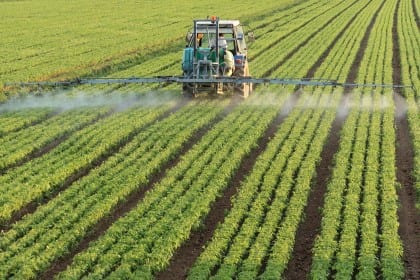Fertile Ground: Ontario’s Agri-Food Industry Delivers Sustainable Growth

Ontario’s agri-food industry continues to experience sustained growth and is an economic leader within the province. In 2015, farming and food processing employed approximately 1 in 9 Ontarians and contributed $36.4 billion in GDP to the province, representing nearly 6% of Ontario’s total GDP. In fact, food processing contributes 15% of the province’s total manufacturing GDP, the highest of any manufacturing sector, even over the automotive industry.
These key findings were reported by the Ontario Chamber of Commerce (OCC) in their latest report on the province’s agri-food industry. OCC provides a united voice on behalf of businesses across Ontario and works with governments to steer policy decisions. In the organization’s Fertile Ground report, recommendations were provided to steer the next federal Agricultural Policy Framework (APF), a governmental strategic plan on how agri-food businesses will be supported.
The current APF, well-known within the Canadian government funding realm for programs such as AgriMarketing, AgriInnovation, and Growing Forward 2, was instated as a 5-year plan, spanning from April 2013 to March 2018. Now approaching the end of this period, the federal and provincial governments have begun planning their next framework.
Related Post: AgriMarketing Export Marketing Grants: Up to $50,000
How Canada’s Current APF Has Led to Agri-Food Industry Success
Under the current Agricultural Policy Framework, Ontario’s agri-food industry has experienced growth, diversification, innovation, and has become more sustainable than it was previously. Some of the reasons for this include:
Global Brand Awareness and Product Traceability
From farm to fork, Ontario agri-food producers and processors must abide by some of the most comprehensive standards and regulations, meant to uphold product quality and consumer safety. These processes have led to domestic and international trust for Ontario-made products. Especially in emerging markets, such as China, where food regulations are not as high, consumers are increasingly demanding high-quality imported products.
This creates an opportunity for Ontario-based companies to leverage the reputation and grow their business. From adding new production lines, to creating new facilities altogether, Ontario food processors are engaging in business expansion projects just to keep up with growing demand.
Profitable International Trade Relationships
Canadian food exports provide an extreme economic boost for the country. As the largest producer of exported foods, Ontario is a key reason for our national success. Of the $51.5 billion in Canadian food being exported each year, Ontario contributes nearly 25% or $12.5 billion. Furthermore, 75% of Ontario food exports head to the United States but is declining as result of greater demand from emerging markets, such as China and India, where new trade agreements are encouraging partnerships.
As international markets become increasingly available, Ontario’s agri-food industry will thrive. Investing in export markets, either by attending tradeshows or performing market research, will help businesses to better understand these markets and identify opportunities to export more.
Sustainable Use of Natural Resources
The Province of Ontario is an international leader for sustainable environmental regulations. This protection of our soil, natural resources, and environment as a whole makes Ontario’s agriculture industry more sustainable than most other sub-national jurisdictions around the world.
The Ontario Cap and Trade program will transform food manufacturing to become more competitive and sustainable. For many food processors, this is an opportunity to adopt energy efficient machinery and processes. Government grants for clean technology adoption are becoming increasingly available and present a way for manufacturers to significantly reduce investment costs.
Innovative Research and Development
In Ontario, there is a deep connection between the agri-food industry and academic research institutions. Ontario’s advanced education system enables businesses to perform innovative research and development projects in state-of-the-art facilities. Better still, food producers and processors can even access researchers from the institutions to solve challenges for them.
Ontario government grants support a variety of research and development projects, both internally and in collaboration with research institutions. Ontario’s agri-food industry is well-versed with many of these programs, which often result in greater yields, productivity improvements, and innovative product development.
Performing R&D projects at colleges and universities across Ontario also supports the development of a highly-skilled workforce. As student researchers become more knowledgeable about the industry, they can then apply this knowledge for companies post-graduation. The agriculture and agri-food sectors even have hiring grants specifically designed to help companies hire recent graduates.
Related Post: Impact Data Demonstrates Effectiveness of Ontario Government Grants
What Ontario’s Agri-Food Industry Needs to Remain Competitive
While the current Agricultural Policy Framework (APF) has been generally effective, the next framework must provide greater support towards certain priorities. For Ontario’s agri-food industry to remain competitive beyond 2018, the next APF must address:
A Supportive Regulatory Environment
Until recently, the Government of Ontario didn’t publically release data on the effectiveness of small business grants and loans. Although the government has presented data about three of its top programs, it must continue to collect and publish these metrics. In order to guide Ontario government grants to the most deserving businesses and projects, an open and transparent reporting process must be put into place.
Ontario’s Cap and Trade regulations should also be implemented in a way that promotes efficiency and sustainability, but not hinder business success. Programs like the CME SMART Green Fund will support these new regulations imposed on manufacturers, and will provide funding to offset clean productivity enhancements.
Furthermore, all levels of Canadian government must work together to strengthen our nation’s agri-food industry. Under the current Agricultural Policy Framework, federal-provincial-territorial (FPT) programs such as the Growing Forward 2 Ontario grant leverage funding form multiple levels of government and provide a greater funding pool for successful applicants.
Workforce Development
A highly skilled and productive workforce is critical to the success of Ontario’s agri-food industry. While employers must be willing to train their employees on innovative equipment and processes, the government must continue funding this activity.
There also needs to be greater collaboration between businesses and academia. Partnering with universities to perform research is necessary in order to train the next generation of skilled food industry workers. There must be greater focus throughout the entire educational system to showing young Ontarians about the career opportunities available to them in the agri-food industry.
Workforce training programs, such as the Canada-Ontario Job Grant (COJG) are quite effective in upskilling employees so they can provide greater productivity and value. Collaborative post-secondary research programs, such as NSERC Engage or Mitacs Accelerate, can also help businesses expose youth to valuable learning experiences while receiving project assistance.
Enhanced Infrastructure
To support the agri-food industry, the provincial government needs to develop an infrastructure plan for rural and northern Ontario. Southern Ontario dominates agriculture production and processing, however there is significant potential to develop and profit from the north. Inadequate infrastructure is currently limiting this expansion, and in order for the sector to reach its full potential, rural and northern Ontario must receive assistance.
Bringing back Ontario government funding programs like the Rural Economic Diversification (RED) grant would greatly help food producers and processors in the area. Also, increased funding for municipalities would help to accelerate natural gas and other ongoing energy projects. Some small business funding programs still offer funding for northern Ontario businesses, such as the programs administered through the Northern Ontario Heritage Fund Corporation (NOHFC).
Food and Beverage Innovation
Ontario’s food and beverage processing industry must adapt to changing consumer preferences. As demand grows for new, innovative food and beverage products, Ontario must play a leadership role to enable competitive research and development projects.
Small business grants must provide support for each stage of innovative product development, from early-stage R&D to commercialization. That’s why the continuation of government grants such as Industrial Research Assistance Program (IRAP) are so important. IRAP funding supports the development and implementation of innovative products and processes that lead to higher profits, and is often used by agri-food processors.
Ontario Agriculture and Agri-Food Businesses Must Invest in Competitiveness
Recommendations outlined in Ontario Chamber of Commerce’s Fertile Ground report provide the Canadian government with great feedback to base their new Agricultural Policy Framework off of. Hopefully these recommendations lead to a better regulatory environment and increased funding support from federal and provincial governments.
However, businesses operating in the agri-food industry must invest in operational efficiencies and innovations in order to succeed. Ontario food producers and processors should be mindful of Canadian government funding programs available to reduce the cost of these investments and increase project ROI.

